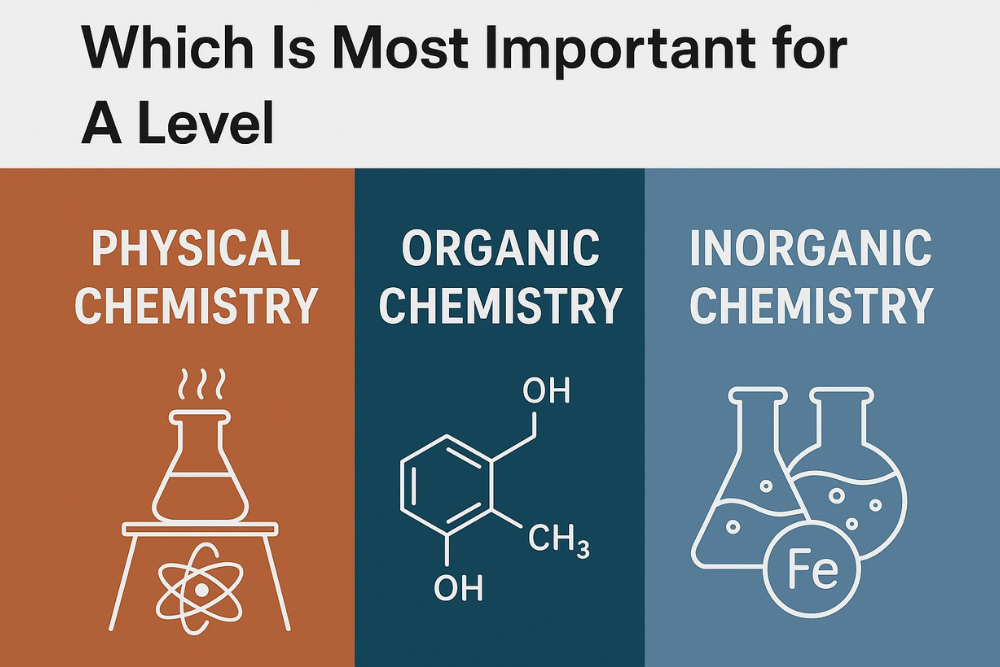Studying A Level Chemistry can sometimes feel overwhelming because of the wide range of topics covered. One of the most common questions students ask is: “Between Physical, Organic, and Inorganic Chemistry, which is the most important to focus on for A Levels?” It’s a valid question because understanding where to put your energy can make your revision more efficient and help you achieve better results.
In this blog, we will break down the key features of each chemistry branch, explore their importance for exams and future studies, and share practical tips on how to approach them. Whether you’re working with a GCSE chemistry tutor to build strong foundations or an A level chemistry tutor to excel in your exams, this post will guide you to make the right study choices.
What Are the Three Branches of Chemistry?
Before we decide which branch is most important, it’s essential to understand what each one involves.
1. Physical Chemistry
Physical Chemistry looks at the physical principles that underpin chemical reactions and behaviors. It connects chemistry with physics and math. You’ll study topics like:
- Thermodynamics – How energy changes during reactions
- Kinetics – How fast reactions happen and what affects the speed
- Chemical Equilibrium – How reversible reactions balance out
- Electrochemistry – How chemical reactions generate electricity
- Atomic Structure – The behavior and arrangement of electrons in atoms
- Acids and Bases – How substances donate or accept protons
This branch is math-heavy and requires logical thinking and problem-solving skills.
2. Organic Chemistry
Organic Chemistry focuses on carbon-based compounds. Because life is carbon-based, this branch connects directly with biology and medicine. Topics you will cover include:
- Hydrocarbons like alkanes and alkenes
- Functional groups such as alcohols, carboxylic acids, esters, and amines
- Reaction mechanisms – step-by-step processes of how molecules change
- Synthesis – making new compounds from simpler ones
- Polymers – large molecules made of repeating units
- Spectroscopy – techniques to identify molecules
Organic Chemistry requires good memory, understanding of mechanisms, and the ability to visualize structures in three dimensions.
3. Inorganic Chemistry
Inorganic Chemistry covers everything else, mainly elements and compounds without carbon-hydrogen bonds. You’ll study:
- Periodic Table trends and properties of elements
- Group 2 (alkaline earth metals) and Group 7 (halogens) chemistry
- Transition metals and their complex ions
- Redox reactions – transfer of electrons
- Properties of acids, bases, and salts
- Coordination compounds
Inorganic Chemistry is sometimes considered more straightforward, as it often involves memorization and understanding of periodic trends.
How Are These Branches Examined in A Level Chemistry?
Understanding the exam structure will help you prioritize topics better.
Most exam boards, like AQA, OCR, and Edexcel, split the A Level Chemistry exams into multiple papers:
- Paper 1 usually focuses on Physical and Inorganic Chemistry. You will encounter calculations, theory, and periodic trends here.
- Paper 2 covers Organic Chemistry in detail, including reaction mechanisms and synthesis.
- Paper 3 includes practical-based questions and problems that can involve all three branches.
Weightage of Topics
While the exact weighting varies by board, Organic Chemistry often carries the largest volume of content and marks. This is because many exams ask for detailed understanding of reaction mechanisms, synthesis routes, and applications.
Physical Chemistry is important because it tests your ability to apply concepts and solve numerical problems, often seen as high scoring if you’re confident with calculations.
Inorganic Chemistry, while smaller in content volume, still forms the foundation for understanding chemical behavior and is important for concepts like periodicity and transition metals.
Which Branch Do Students Find Most Difficult?
From experience and feedback gathered by GCSE chemistry tutors and A level chemistry tutors, many students find Organic Chemistry the most challenging.
Why?
- It involves learning numerous reaction mechanisms, which can be confusing without clear visualization.
- The volume of content is large, and many reactions build upon each other, requiring regular revision.
- Memorization plays a big role, especially with reagents, conditions, and products.
Physical Chemistry can be tough if you struggle with math or abstract concepts like energy and equilibria.
Inorganic Chemistry is generally perceived as easier but can still be challenging when it comes to transition metals and complex ion chemistry.
Why Is Each Branch Important Beyond A Levels?
The relevance of each branch extends beyond exams, especially if you have future plans in science or medicine.
Organic Chemistry
If you want to study medicine, pharmacy, biochemistry, or any life sciences, Organic Chemistry is essential. Biological molecules like proteins, DNA, and drugs all involve organic compounds. A solid grasp of organic reactions will help you understand how drugs work and how biological processes happen.
Physical Chemistry
Physical Chemistry is the foundation for fields like chemical engineering, physics, materials science, and even environmental science. Concepts like thermodynamics and kinetics are crucial for understanding industrial processes, energy transfer, and reaction optimization.
Inorganic Chemistry
Inorganic Chemistry is key for studying geology, metallurgy, materials science, and environmental chemistry. Understanding metals, minerals, and periodic trends is essential in these areas.
How to Study Each Branch Effectively
If you want to maximize your grades, it’s important to adapt your study techniques for each branch.
Physical Chemistry Study Tips
- Practice lots of numerical problems: Past papers and workbook questions help you get familiar with typical questions.
- Understand concepts over memorization: Know why reactions happen, not just how.
- Work on math skills: Be confident with algebra, rearranging equations, and using scientific calculators.
- Use diagrams: Energy profiles and reaction coordinate diagrams help visualize ideas.
- Get help from tutors: A good A level chemistry tutor can simplify complex concepts.
Organic Chemistry Study Tips
- Create reaction maps and flowcharts: Connect related reactions visually.
- Make flashcards: For reagents, mechanisms, and conditions.
- Practice drawing: Structures, mechanisms, and synthesis routes.
- Understand mechanisms step-by-step: Don’t just memorize; ask why each step happens.
- Use model kits or software: To understand 3D structure and stereochemistry.
- Regular revision: Because of the volume, repeated practice is key.
Inorganic Chemistry Study Tips
- Summarize groups and trends: Make concise notes on each group of elements.
- Memorize key facts: Use mnemonics and repetition.
- Practice writing formulae: Especially for complex ions and redox equations.
- Understand periodic trends: Not just memorize but know the reasoning.
- Link theory with experiments: Practical knowledge helps cement ideas.
The Role of Tutors in Chemistry Success
While self-study is important, working with a GCSE chemistry tutor or A level chemistry tutor can transform your understanding and confidence.
Here’s how a tutor helps:
- Personalized support: Tutors identify your weak points and focus on them.
- Exam technique: They teach how to approach different question types.
- Clear explanations: Complex topics become easier with a tutor’s guidance.
- Practice and feedback: Regular tests and corrections improve skills.
- Motivation and accountability: A tutor keeps you on track with your goals
If you struggled with chemistry at GCSE level, starting with a GCSE chemistry tutor before moving to an A level chemistry tutor can build a strong foundation.
Practical Chemistry and Why It Matters
A Level Chemistry isn’t just theory—it includes practical experiments that help you understand real-world chemistry.
- Physical Chemistry practicals cover titrations, calorimetry, and rate experiments.
- Organic Chemistry practicals include synthesis, purification, and identification.
- Inorganic Chemistry practicals involve tests for ions, flame tests, and reaction observations.
Your practical knowledge will be tested through questions in exams and sometimes through a practical endorsement. Hands-on experience reinforces theory and improves your overall understanding.
So, Which Chemistry Branch Should You Focus On?
While all branches are important, Organic Chemistry is often the heaviest in content and exam weighting. Most students spend more time on organic reactions, mechanisms, and synthesis.
However, don’t neglect Physical Chemistry, because it provides crucial problem-solving skills and can be a reliable source of marks if you master the calculations.
Inorganic Chemistry may have less volume, but it’s fundamental for understanding chemical behavior and trends and often easier to score in if you memorize and practice well.
Final Advice for A Level Chemistry Students
- Start early: Build your skills with a GCSE chemistry tutor to avoid last-minute panic.
- Balance your study: Don’t ignore any branch; all three appear on your exams.
- Practice regularly: Use past papers and practice questions consistently.
- Use varied resources: Textbooks, videos, apps, and tutor support all help.
- Seek help: If stuck, reach out to a tutor who specializes in A Level Chemistry.
Frequently Asked Questions (FAQs)
Q1: Can I ignore Inorganic Chemistry if I’m strong in Organic and Physical?
No. A Level exams test all three branches, so ignoring any can lower your overall grade.
Q2: Is Organic Chemistry really that hard to learn?
It can be tricky but becomes manageable with regular revision and good study methods, especially with a tutor’s help.
Q3: When should I get a chemistry tutor?
Starting with a GCSE chemistry tutor in Year 10 or 11 is ideal. For A Levels, begin tutoring in Year 12 to stay ahead.



